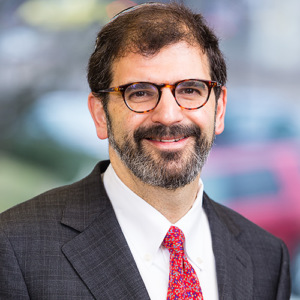Hi SCOTUS, Reproductive Freedom is Religious Freedom
 By Rabbi Asher Lopatin
By Rabbi Asher Lopatin
It has been over two months since all eyes were glued on the state of Texas following the passage of SB 8, the restrictive six-week abortion ban. Since then, I feel like I am being transported to a different America — an America that just like 50 years ago does not allow Jews to practice their religion by banning access to essential reproductive health care, including abortions.
Laws that restrict abortion access bars me from practicing my Judaism. In modern Orthodox tradition, the denomination of Judaism that I observe, our stance is clear. Abortion is not only permitted in Judaism but at times required if the life of the pregnant person is in danger.
“Danger” can be defined in multiple ways including both physical and mental health. The mental state of a pregnant person is as critical as physical health. If continuing a pregnancy is endangering someone’s mental health, that is also considered endangering their life.
As a pulpit rabbi for over 25 years, I have had the privilege and responsibility to consult with couples on whether or not to abort their pregnancies.
One couple who practiced Conservative Judaism had approached me after finding out that their Orthodox daughter was carrying a fetus that had Trisomy 18, a rare chromosomal condition associated with abnormalities in many parts of the body. Only up to 10% of patients live past the first year of life with this condition, and these children often have severe intellectual disabilities. After consulting with their doctor, the young couple were interested in speaking with an Orthodox rabbi to get their perspective. I, along with my colleagues, agreed wholeheartedly that it was the right thing to abort.
Another couple who were expecting twins approached me at another time when the mother-to-be was dealing with some medical issues that only allowed one of her two fetuses to remain viable. I helped them make the impossible decision to save the stronger of the fetuses as the more viable future life. To this day, only I and the couple know about this decision.
Both of the above examples involved deeply difficult, intimate decisions. Creating a family is one of the most central aspects of practicing Judaism. And although I will never be pregnant, as a father of four, I know it to be a sensitive, personal experience. And now in the state of Texas, these couples approaching me to have these conversations in the first place are considered illegal.
Although the mental state of the mother or pregnant person has become much more understood within the Orthodox community over time, it is clear that the life of the pregnant person always takes precedent.
I, along with several Orthodox colleagues, wholeheartedly support and embrace our tradition. And as an active participant in National Council of Jewish Women’s Rabbis for Repro campaign, I will continue to use my voice as a rabbi to teach, write and speak out about reproductive rights and Judaism in the United States and in the Jewish community, regardless of restrictive bans.
Throughout America’s history, there have been instances that deterred Jews from freely practicing their religion. 100 years ago when Jewish refugees entered Ellis Island, it was quite difficult to observe the commandment to not work on the Sabbath. But now this abortion ban is the most serious violation I can think of in modern times.
With more restrictions and bans being introduced in the states, along with the pending Supreme Court decisions both related to Texas’ ban and other bans across the country, I am questioning what comes next.
I can’t imagine an America where I can’t practice my Judaism.
Rabbi Asher Lopatin serves Kehillat Etz Chayim, an Open Orthodox synagogue in Oak Park and Huntington Woods, Michigan and is an active member of National Council of Jewish Women’s Rabbis for Repro campaign.
